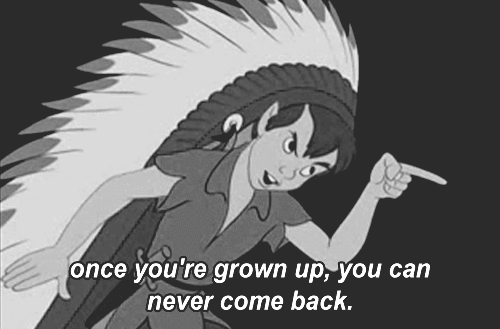What do you think?
Rate this book


235 pages, Paperback
First published October 1, 1911

«All children, except one, grow up.»
The incipit of Peter Pan of J.M. Barrie is the perfect synthesis of the book. I will try to make the point using as inspiration the words of a child, namely three phrases from my daughter Arianna while in the evening she was listening in her bed my reading of Peter Pan (seventeen chapters read on as many nights with the emphasis of a talented narrator):
1 - "Peter Pan is a bad guy" Yes, my daughter did not like to the protagonist of the novel. I did not investigate the reason for her grudge. Probably she didn't like the fact that Peter doesn't want to grow. Not strange, when you are a child usually you want to grow because several tings are forbidden, etc. It is only when you realize that those years are forever lost that you regret for the lost childhood. Everything normal.
2 - "But why Hook have to die?" My daughter almost burst into tears in the solemn moment of the pirate's death. The bad guy of the novel is not that bad after all? I like James Uncino too (it is obvious that the question was asked by the blood of my blood). Actually, it is the death of a central character that shakes the mind of children, a character they started to know and whose presence they are used to. And punctually the tremendous question arrives: "Why do we have to die?" (dear Arianna, if I exactely explain it to you, maybe you also become like Peter Pan, a child who refuses to grow). I buy time and go further.
3 - "NOOOOOOOOOOOO!" The scream is thrown by my daughter when Peter Pan closes the window of the children's room to prevent their home return. I think that one of the things that terrorizes more a child is to stay without their loved ones. The strenght and especially the desire to break away from the family is perhaps the best indicator of the lost childhood.
I instinctively associate Peter Pan with the The Little Prince of Antoine de Saint-Exupéry. However, although speaking the same language (that of children), and dealing with common themes, I enjoyed more Peter Pan and its sad and sweet conclusion. Imagination is a powerful ability, but it is consumed by time. You just have to use it as long as you can. Thereby children fly with their minds and their hearts:
«It is only the gay and innocent and heartless who can fly»Surely, being all three things at the same time when you are an adult is impossible.
Vote: 8

«Tutti i bambini crescono, meno uno»
L'incipit di Peter Pan di J.M. Barrie è la perfetta sintesi di tutto il libro. Vista la tematica, cercherò di fare il punto della situazione utilizzando come spunti di pensiero le parole di una bambina, vale a dire due frasi pronunciate da mia figlia Arianna mentre la sera ascoltava nel suo letto la mia lettura di Peter Pan (diciassette capitoli letti in altrettante serate con un'enfasi da narratore rodato):
1 - "Peter Pan è un cattivone" Ebbene si, mia figlia non ha preso in simpatia il protagonista del romanzo. Non ho indagato a fondo il motivo del suo rancore. Probabilmente è stato il voler rimanere bambino a tutti i costi che a mia figlia proprio non è andato giù. Non c'è nulla di strano in questo, quando si è bambini si vuole crescere, parecchie cose ti sono proibite, etc. E' solo quando ci si rende conto che quegli anni sono persi per sempre che si rimpiange la propria fanciullezza. Tutto nella norma.
2 - "Ma perché Uncino �� dovuto morire?" Mia figlia è quasi scoppiata in lacrime nel solenne momento della morte del pirata. Il cattivo del romanzo dopotutto non è poi così cattivo. A me James Uncino è sempre stato simpatico, difatti (è evidente che a formulare la domanda è stato il sangue del mio sangue... tesoro di papà!) In realtà �� la morte di un personaggio centrale che scuote l'animo di un bambino, un personaggio che hai cominciato a conoscere e alla cui presenza ti sei abituato. E puntuale arriva il tremendo quesito, La Domanda con la D maiuscola: "Perchè dobbiamo morire?" (Cara Arianna, se te lo spiego per bene, magari diventi anche tu, come Peter Pan, una bambina che si rifiuta di crescere). Tergiverso e vado oltre.
3 - "NOOOOOOOOOOOO!" L'urlo di disappunto viene lanciato da mia figlia quando Peter Pan chiude la finestra della camera dei bambini per impedire il loro ritorno a casa. Credo che una delle cose che terrorizza di più un bambino sia il rimanere senza i propri cari. La capacità e soprattutto la voglia di staccarsi dalla propria famiglia è forse il principale indicatore per la perduta fanciullezza.
Istintivamente mi viene da associare Peter Pan al Il piccolo principe di Antoine de Saint-Exupéry. Tuttavia, pur parlando la stessa lingua, quella dei bambini, e trattando tematiche comuni, ho apprezzato di più Peter Pan e il suo finale triste e dolce. L'immaginazione è una capacità potente, che però va affievolendosi col tempo. Non resta che sfruttarla appieno fin quando si può. E allora volano con la mente e con il cuore i bambini.
«Solo chi è allegro, innocente e senza cuore può volare»Una cosa è certa: da adulti, essere contemporaneamente tutte e tre le cose è impossibile.
Voto: 8




